Blockchain technology is not impervious to hacking, but it is highly resistant. Cyber-attacks can occur, though they are relatively rare due to the robust security features inherent in blockchain design.
Blockchain, the underlying technology behind cryptocurrencies like Bitcoin, has revolutionized the way digital transactions are recorded and verified. Its decentralized nature and cryptographic algorithms create a secure environment where each transaction is transparent and immutable. The strength of blockchain lies in its distributed ledger, where each block is linked and secured using cryptography.
This structure makes altering recorded data exceedingly difficult, as it would require overwhelming computational power to compromise the entire network. Despite its robust security measures, blockchain is not entirely hack-proof. Security breaches have occurred, primarily through smart contract vulnerabilities, exchange platform weaknesses, and user error. Thus, while blockchain itself offers high-level security, associated applications and human factors can introduce risks that savvy hackers might exploit.
Myths Vs. Reality: The Security Of Blockchain
Many people think blockchain is unbreakable. This belief is not entirely true. Blockchain technology does have robust security features. These features make tampering with data very tough. Yet, it’s not impossible for hackers to attack blockchain systems.
Cybersecurity breaches in blockchain have occurred. Examples include smart contract vulnerabilities and exchange platform hacks. Even so, such events are not due to flaws in blockchain itself. Rather, they stem from weak points in applications using blockchain. It’s pivotal to distinguish between blockchain as a technology and its applications.
| Misconception | Reality |
|---|---|
| Blockchain is 100% secure. | Highly secure, yet not foolproof. |
| All blockchains are the same. | Security varies across different types. |
| Smart contracts can’t be hacked. | Contract bugs can be exploited. |

Blockchain Basics: The Technology Explained
Blockchain technology relies heavily on decentralization. This means that instead of one single place for storing information, the blockchain uses many. Think of it like having your toy cars spread out in different rooms rather than just one. If someone wanted to take all your toys, they would have to go into every single room instead of just one. This makes it really hard for someone to steal or change the information.
The way blockchain keeps information safe is through something called cryptography. It’s like writing a secret code that only you and your friends know. Even if someone else sees your message, they won’t understand it because they don’t know the secret code. Also, consensus mechanisms are rules that everyone using the blockchain must agree on. It’s like a game where all players must agree on the rules before you can start playing.
Notable Hacks In Blockchain History
The DAO attack shook the blockchain world in 2016. A hacker exploited a vulnerability in the DAO (Decentralized Autonomous Organization) code. This led to the theft of around $50 million. The community responded by implementing a “hard fork” to reverse the transactions.
Mt. Gox breach, once the largest Bitcoin exchange, faced a massive attack in 2014. Unknown hackers stole about 850,000 bitcoins, valued at $450 million at that time. This incident exposed serious flaws in the exchange’s security measures. It served as a wake-up call for better security in cryptocurrency exchanges.
Analyzing The Vulnerabilities
Smart contract weaknesses often open doors for hacking. These contracts are like special rules that live on blockchain. But, sometimes they have mistakes in their code. Coders can’t change them easily once they are on the blockchain. Bugs can be exploited by hackers and cause loss of money.
Explaining 51% attacks, it’s true that blockchains are normally secure. Yet, if more than half of the network’s power is controlled by one group, they can influence it. This means they could
stop new transactions, change the order of transactions, or double-spend coins.
The Human Factor: Phishing And Social Engineering
Blockchain technology boasts strong security features, making it challenging for hackers to breach. Yet, security risks still exist, mostly due to human error. User awareness is crucial in preventing these threats.
Scams target blockchain users through deceptive tactics. Phishing attempts, for instance, trick users into revealing sensitive information. Such details can lead to unauthorized access to blockchain accounts.
Understanding and recognizing these scams is vital. Users should learn about common social engineering methods used by cybercriminals. Programs that educate on safe practices are essential in defending against these attacks.
Always double-check communication sources and never share private keys. By staying vigilant, blockchain users can greatly reduce their risk of falling victim to scams.
Enhancing Security: Best Practices For Users
Securing private keys is crucial for blockchain safety. Store keys in a place that’s hard to find. Don’t keep them online where hackers can steal them. Use a hardware wallet or paper wallet for better protection. These methods keep keys off the internet.
Using two-factor authentication (2FA) adds an extra security layer. This means you need two types of proof to access your account. These types could be a password and a code sent to your phone. This stops others from entering your account, even if they know your password. Always turn on 2FA on all accounts.

Future-proofing Blockchain
Many experts believe blockchain is quite secure. Yet, no technology is perfect. Emerging security technologies aim to shield blockchain against threats. Quantum computing could change the security game.
Quantum computers use different rules than regular ones. They solve complex problems much faster. This might threaten blockchain’s protection. The race is on to create quantum-resistant blockchains.
Teams are working on new encryption methods. These should keep blockchains safe from quantum attacks. This is crucial as quantum computing becomes more common. We must keep our data secure.
Regulation And Compliance: Creating A Safer Blockchain Ecosystem
Government policies play a crucial role in the security of blockchain technologies. Strengthening regulations help deter hackers and impose safeguards on digital assets. Countries around the world are implementing measures that mandate the reporting of crypto transactions and the enforcement of anti-money laundering (AML) laws.
Similarly, the blockchain industry is developing standards to guide application development. These standards include best practices for coding, security audits, and multi-layered cybersecurity approaches. Consensus mechanisms such as Proof of Work (PoW) and Proof of Stake (PoS) also contribute to the overall security framework, making hacking attempts more complex and resource-intensive.
Frequently Asked Questions For Can Blockchain Be Hacked
Is Blockchain Technology Truly Secure?
Blockchain is renowned for its security due to encryption and decentralized structure, making it difficult for unauthorized changes without consensus.
Can Blockchain Be Hacked Or Tampered With?
While theoretically robust, blockchain can be hacked through 51% attacks, smart contract vulnerabilities, or phishing, but it’s challenging and rare.
What Are Common Blockchain Security Risks?
Security risks include 51% attacks, code flaws, and user security breaches such as weak passwords and phishing scams, despite the underlying technology robustness.
How Does Blockchain Prevent Unauthorized Access?
Blockchain utilizes cryptographic techniques, consensus protocols, and distributed networks to prevent unauthorized changes and ensure data integrity.
Conclusion
Despite its strengths, blockchain isn’t impervious to threats. Security must evolve with technology. Vigilance and innovation are key in safeguarding blockchain’s integrity. As we press forward, understanding and improving blockchain security is paramount for trust in this digital age. Your cybersecurity awareness can make a difference.

